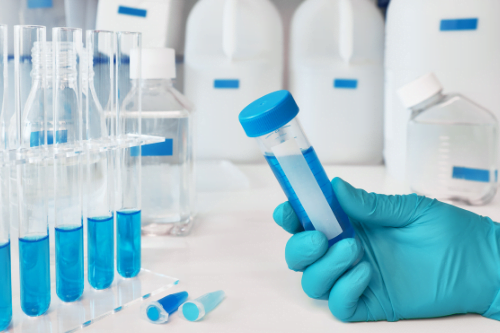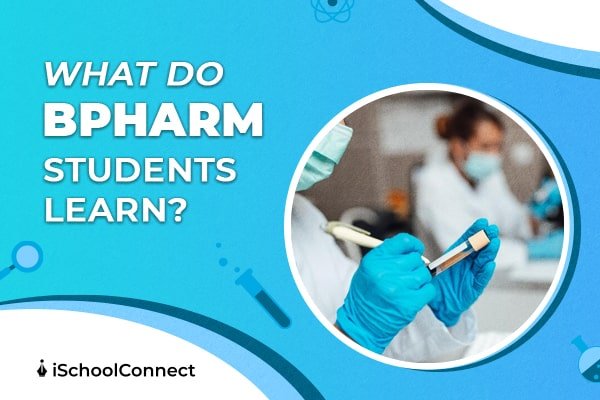Table of Contents
- 1. Which universities abroad offer B. Pharm programs?
- 2. What are the eligibility criteria for B. Pharm programs abroad?
- 3. What are the subjects in the B. Pharm syllabus?
- 4. What are the postgraduate programs that I can consider after B. Pharm?
- 5. What will be my expected salary with a B. Pharm qualification?
- Key Takeaways
- FAQs
Pharmacists are medical professionals trained in preparing and dispensing prescription medications to patients. As per the United States Bureau of Labor Statistics, a projection of 11,300 openings is expected for pharmacists between 2020 and 2030. A Bachelor of Pharmacy (B. Pharm) program is a four-year undergraduate degree for students seeking careers as pharmacists. A B. Pharm syllabus is divided into 6 or 8 semesters-
- Healthcare business
- Biochemical science
As a part of the program syllabus, students are required to perform several practicals and experiments to successfully receive the qualification. If you are an aspirant considering pursuing a B. Pharm program, the right information can help you make informed decisions regarding your education.
Keep reading to discover everything you need to know about the B. Pharm syllabus and program!
1. Which universities abroad offer B. Pharm programs?
There are several universities across the world that offer excellent B. Pharm programs. Some of the most reputed colleges abroad are listed below-
- Monash University (Australia)
- University of Cambridge (United Kingdom)
- University of Toronto (Canada)
- Harvard University (United States)
- The University of North Carolina (United States)
- The University of Manchester (United Kingdom)
- University of Oxford (United Kingdom)
2. What are the eligibility criteria for B. Pharm programs abroad?
The entry requirements for undergraduate pharmacy programs abroad vary from university to university. Admissions to B. Pharm programs are also highly competitive.
As a candidate, you will be expected to display a high level of proficiency in the following subjects-
- Biology
- Physics
- Chemistry
- Mathematics
In addition to the above, the basic eligibility requirements for admission to B. Pharm programs abroad include-
- Proof of language proficiency – Students have to achieve a minimum score and above to gain admission to B. Pharm programs abroad. These scores are-
- In addition to the above scores, students will be required to present the following documents-
- Proof of acceptance to a university abroad
- Grade point average (GPA) scorecard – minimum of 4.5 (European grade scale) or D (American grade scale)
- Statement of purpose (SoP)
- Police clearance
- Passport copies

3. What are the subjects in the B. Pharm syllabus?
All B. Pharm programs are divided into 8 semesters spread out across 4 years. The syllabus constitutes several theoretical and practical subjects.
If you consider pursuing a regular B. Pharm, here is the syllabus for each year.
Year 1
- Pharmaceutical Organic Chemistry (I)
- Environmental Sciences
- Human Anatomy & Physiology
- Pathophysiology
- Biochemistry
- Remedial Mathematics
- Pharmacognosy (I)
Year 2
- Pharmacognosy (II) & Phytochemistry
- Pharmacology
- Medicinal Chemistry
- Pharmaceutical Engineering
- Pharmaceutical Microbiology
- Physical Pharmaceutics
- Pharmaceutical Organic Chemistry (II)
Year 3
- Medicinal Chemistry
- Pharmaceutical Biotechnology
- Herbal Drug Technology
- Pharmaceutical Jurisprudence Ethics
- Industrial Pharmacy (I)
- Hospital Pharmacy
Year 4
- Experimental Pharmacology
- Cosmetic Science
- Cell & Molecular Biology
- Pharmacovigilance
- Biostatistics & Research Methodology
- Pharmacy Practice
- Computer-Aided Drug Design
- Dietary Supplements & Nutraceuticals
- Industrial Pharmacy (II)
- Pharmaceutical Regulatory Science
- Novel Drug Delivery System
- Project related to Elective
4. What are the postgraduate programs that I can consider after B. Pharm?
Once you have completed your B. Pharm program, you can consider several postgraduate options.
These include-
MBA in Pharmaceutical Management
This is a management program that focuses on the business practices implemented in the field of pharmacy. The syllabus largely comprises accounting and management strategies.
Post-Graduate Diploma in Pharmacy Practice & Drug Store Management
A one-year program that provides a practical perspective on drugstores worldwide is an excellent option to consider after B. Pharm.
Post-Graduate Diploma in Clinical Trial Management
This is a fast-growing program designed for students who want to learn the technical standards and operations used in clinical research. As a part of this program, you will also be required to undertake an infrastructural study.
M. Sc in Pharmaceutical Chemistry
This is a two-year program and students are trained on different aspects of quality assurance involved in a drugstore and developmental remedies. The program syllabus also covers methods of detecting and testing samples provided in laboratories.

5. What will be my expected salary with a B. Pharm qualification?
Once you have received a B. Pharm qualification, there are several professional opportunities that you can consider. These include working as a pharmaceutical technician at-
- Pharmaceutical factories
- Military pharmacies
- Veterinary pharmacies
- Hospital pharmacies
- Community pharmacy organizations
A pharmacist’s average salary abroad is largely dependent on the country, type of organization, and amount of experience.
Some of the countries that offer high-paying pharmaceutical opportunities are-
- Switzerland
- Average Annual Salary – USD 83,600
- Canada
- Average Annual Salary – USD 80,700
- United Kingdom
- Average Annual Salary – USD 57,000
Your earning potential will significantly increase with a postgraduate qualification and experience.
Key Takeaways
- B. Pharm programs are among the most popular programs for aspirants seeking careers in the field of pharmacy.
- There are several universities abroad that offer reputed B. Pharm programs for candidates to consider.
- A B. Pharm program’s syllabus is designed to provide all-rounded theoretical and practical knowledge on every aspect of the field.
- Several postgraduate programs can be considered after the completion of a B. Pharm program.
- Seeking opportunities in well-paying economies can be a great way to earn well!
If you have any more questions or doubts, or if you need help preparing for the exam, feel free to drop a comment or reach out to us. We’d be very happy to help!
Liked this blog? Read: Top 30 Science quiz questions and answers for practice!
FAQs
Q1. Do I require a license for employment in the Pharmacy field?
Answer – Yes, you will need a license before seeking employment in the field.
Q2. Are there any scholarships available for admission to B. Pharm programs abroad?
Answer – Yes, several scholarships award partial funding to students seeking admission to B. Pharm programs. These include the Anu Judith Wright scholarship, Bruce Lee Foundation scholarship, and Education Future International scholarship.
Q3. What is the duration of a Master’s program in Pharmacy?
Answer – While this varies depending on the country and university, most Master’s programs in Pharmacy range between 10 months to 4 years.






